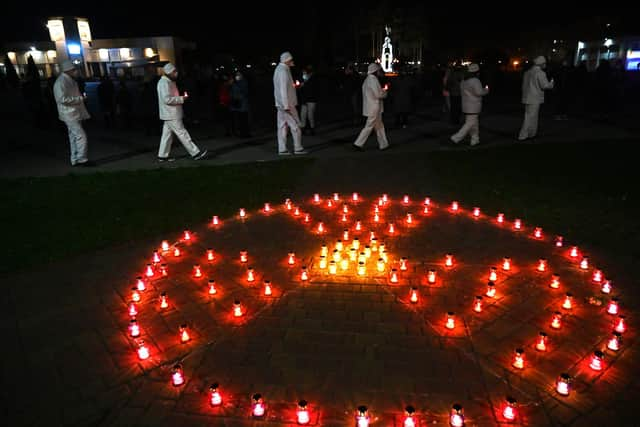35 years after Chernobyl disaster, nuclear power industry is struggling and is not part of climate change solution – Dr Richard Dixon
Chernobyl had a remarkable impact around the world, with new nuclear plans put on hold and reactors under construction never completed; the disaster even contributed to the Soviet Union’s eventual fall.
If you were an adult at the time you probably remember wondering if you had been out in the rain during the days of worst fallout. It was only in 2011 that restrictions on Scottish sheep movements due to contaminated soil were lifted and radioactive isotopes from Chernobyl still show up in fish and marine sediments around Scotland.
Advertisement
Hide AdAdvertisement
Hide AdThe US TV series of Chernobyl has brought the horror of what happened 35 years ago to a new generation. Add to that the three reactors melting down in the Fukushima disaster ten years ago and you might think the nuclear industry has had its day.
But ever alive to an angle for PR spin, the industry is now telling us it is the answer to climate change. Environmentalist Jonathon Porritt has just produced an excellent report giving the lie to the industry’s arguments on that.
Since Chernobyl, only three reactor projects have begun in Europe, all being built by the French state-owned company EDF.
The Olkiluoto reactor in Finland is now running 13 years late and three times over budget and might generate its first power next year. Plans for another reactor at the site have been cancelled. The Flamanville reactor in France is only running 11 years late and will be more than three times over budget.


The Hinkley Point C reactor was approved in 1990 after the UK’s longest public inquiry, so long ago that my father submitted evidence.
Construction began in earnest in 2014. EDF originally promised the station would be cooking your Christmas turkey in 2017 but the start date is now expected to be 2026 at the earliest.
The nuclear enthusiasts of the 1990s told us that the UK needed eight new nuclear stations and they would cost £2 billion each. As UK and foreign companies have given up or put plans on hold, Hinkley is the only one under construction and costs have risen to at least £23 billion. The economics only work at all because the government has guaranteed to make every electricity consumer in the UK pay higher bills for the next 35 years.
The obvious lesson we seem incapable of learning is that, even with strong state support, the nuclear industry cannot build a new reactor by the date or for the price they promise.
Advertisement
Hide AdAdvertisement
Hide AdScotland has four operational reactors. The two at Hunterston have had major problems with cracks in their cores and are unlikely to still be running in 2022. The two reactors at Torness are actually the newest reactors in the UK, having been opened by Margaret Thatcher in 1989. They are due to close in 2030. No one is daft enough to propose new reactors for Scotland.
With ridiculous cost and time overruns, and the cost of renewables beating nuclear in all circumstances, surely it is time to admit that we have reached the end of the nuclear dream.
Dr Richard Dixon is director of Friends of the Earth Scotland
A message from the Editor:
Thank you for reading this article. We're more reliant on your support than ever as the shift in consumer habits brought about by coronavirus impacts our advertisers.
If you haven't already, please consider supporting our trusted, fact-checked journalism by taking out a digital subscription.
Comments
Want to join the conversation? Please or to comment on this article.
